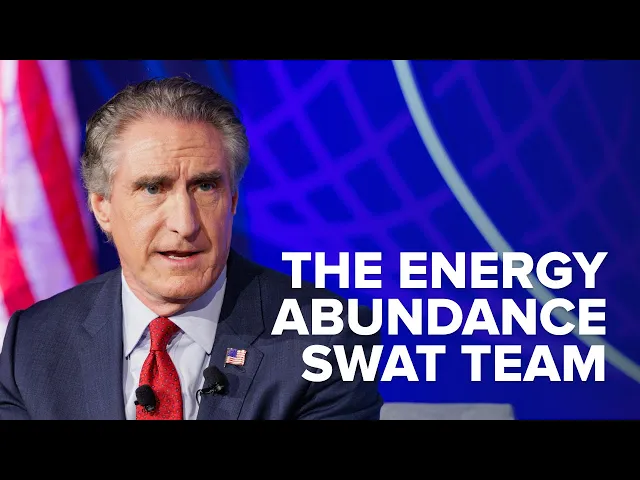Powering the Next Big Things

Energy abundance powers America's AI race
In a dynamic conversation at a recent tech conference, US Secretary of the Interior Doug Burgum shared his vision for America's energy future with striking urgency. Speaking with the directness of an entrepreneur rather than a politician, Burgum outlined how energy abundance sits at the intersection of US economic prosperity, national security, and technological leadership—particularly in the high-stakes global AI race.
Key Points:
- America faces an energy emergency specifically related to AI development, with Burgum declaring: "We don't have enough electricity and we're going to lose the AI arms race with China."
- The administration views accessible, reliable energy sources as critical national priorities, establishing a National Energy Dominance Council chaired by Burgum to coordinate across government.
- Technological innovation is transforming traditional energy sectors, with Burgum highlighting how modern oil extraction involves precision engineering that can "drill the lock out on your front door" from two miles underground.
- The administration is actively cutting permitting red tape to accelerate critical infrastructure development, positioning natural gas as the "bridge to nuclear" while embracing an "all of the above" approach to energy sources.
- Domestic mining of critical minerals has become a national security priority, with China currently controlling 85% of rare earth mineral refining—essential components for technology and defense.
The AI-Energy Nexus: An Overlooked Strategic Challenge
The most compelling insight from Burgum's remarks is his framing of energy abundance as fundamentally an AI competition issue. While much attention has focused on chips, talent and algorithms, the Secretary makes a convincing case that electricity production is actually the critical bottleneck that could determine technological supremacy.
This perspective reframes the entire national conversation around energy policy. According to Burgum, "In AI, we're manufacturing intelligence and whoever manufactures the most intelligence is going to win." This manufacturing process requires enormous electricity resources that the current US grid cannot supply. The administration sees this as an existential threat that demands immediate action—one that transcends traditional political divisions about climate policy.
What makes this insight particularly significant is its economic implications. Burgum notes that tech companies are now willing to pay premium prices for electricity because "a kilowatt is worth more today than it ever has been" when used for AI development. This has created an unprecedented situation where tech
Recent Videos
How To Earn MONEY With Images (No Bullsh*t)
Smart earnings from your image collection In today's digital economy, passive income streams have become increasingly accessible to creators with various skill sets. A recent YouTube video cuts through the hype to explore legitimate ways photographers, designers, and even casual smartphone users can monetize their image collections. The strategies outlined don't rely on unrealistic promises or complicated schemes—instead, they focus on established marketplaces with proven revenue potential for image creators. Key Points Stock photography platforms like Shutterstock, Adobe Stock, and Getty Images remain viable income sources when you understand their specific requirements and optimize your submissions accordingly. Specialized marketplaces focusing...
Oct 3, 2025New SHAPE SHIFTING AI Robot Is Freaking People Out
Liquid robots will change everything In the quiet labs of Carnegie Mellon University, scientists have created something that feels plucked from science fiction—a magnetic slime robot that can transform between liquid and solid states, slipping through tight spaces before reassembling on the other side. This technology, showcased in a recent YouTube video, represents a significant leap beyond traditional robotics into a realm where machines mimic not just animal movements, but their fundamental physical properties. While the internet might be buzzing with dystopian concerns about "shape-shifting terminators," the reality offers far more promising applications that could revolutionize medicine, rescue operations, and...
Oct 3, 2025How To Do Homeless AI Tiktok Trend (Tiktok Homeless AI Tutorial)
AI homeless trend raises ethical concerns In an era where social media trends evolve faster than we can comprehend them, TikTok's "homeless AI" trend has sparked both creative engagement and serious ethical questions. The trend, which involves using AI to transform ordinary photos into images depicting homelessness, has rapidly gained traction across the platform, with creators eagerly jumping on board to showcase their digital transformations. While the technical process is relatively straightforward, the implications of digitally "becoming homeless" for entertainment deserve careful consideration. The video tutorial provides a step-by-step guide on creating these AI-generated images, explaining how users can transform...
